Genre: Sports Developer: High Score Productions Publisher: Electronic Arts Players: 1-2 Released: 1994
Before becoming the video game juggernaut, before developing a perennial slew of titles (with varying degrees of quality), Electronic Arts published some definitive sports titles. During the early-to-mid 1990s, the Madden series slowly separated itself as the video game football franchise, and a series of trials and errors paved the way for the basketball mainstay, NBA Live. Naturally, EA aspired to create a great baseball series to augment their sports catalogue (which continued to grow, adding the PGA Tour and NHL to the mix as well). While attempts to strike a deal with Major League Baseball proved futile during the initial go-around, the publisher signed an agreement with the next best thing: The MLB Player’s Association.
Yes, the borderline absurd acronym that graces the cover of MLBPA Baseball means that you will find no MLB teams within this game. Given the graphical limitations of the time period, however, this restriction really has no bearing on the presentation. With the player’s association license, EA has access to virtually all (with a few defectors) MLB players. And these players just so happen to play on teams based in their respective cities, wearing their respective colors. In fact, when you immerse yourself in the gameplay, you will have to go out of your way to notice that the title did not receive the official license.
Now, as any fan of some of the newer EA Sports titles can tell you, the discussion of licenses is a non-issue should the quality of the game falter. With that obvious segue, we will move on to the meat and bones of MLBPA Baseball. One thing you will notice quickly about this title: The quirky, beguiling music. The title screen tune does a splendid job of getting you into the baseball mood; the in-game music (although somewhat limited) continues the catchy soundtrack…no pun intended. In addition to the melodies, MLBPA Baseball provides sound bytes for the umpire. They are relegated to simple statements (“Strike!” “YER OUT!”), but do a nice job of adding to the ambiance.
Other presentational aspects include: A bird’s-eye view of a generic baseball field utilized as the backdrop for the game’s menu, a password enabled season mode, and some grainy, in-game video for various, celebratory actions (home runs, spectacular catches, etc.). Easily apparent from even the briefest of perusals: EA included many bells and whistles to, at the very least, create an appealing package. Now, only the quality of the gameplay remains in question.
In reviewing this game, I tread a very fine line, simply because MLBPA Baseball represented my first sports game experience. Many nostalgic memories allow me to overlook some of the flaws, but while I may view this as a great title, the review will be based on how the average gamer would tolerate any snags in the gameplay. To that end, this title is a solid, enjoyable baseball game.
Oftentimes, over simplifications seem to be one of the main drawbacks to MLBPA Baseball. You will use the same button to pitch as you do to hit, locating the throw with the D-Pad. Some strategy can be employed by utilizing the option to switch control from the batter to a base runner, granting you control of all base-stealing. Defensively, the now-clichéd ‘center yourself within the exaggerated shadow of the fly ball, throw to a base using the respective direction on the D-Pad’ control system. As you might have already guessed, the game plays it safe—neither bringing anything to, nor taking anything off the metaphorical table.
MLBPA Baseball features no abundance of cutting edge features, as alluded to in the description of the bare-bones gameplay above. However, a fairly advanced (for the time) fatigue and substitution system add to the strategy involved in performing well within the game. What exactly does this entail? Let’s just say that getting attached to one pitcher will lead to dire consequences.
All of these intangibles contribute to the uniqueness of MLBPA Baseball. It looks and feels like a classic baseball simulation. But its inability to take risks and become a trailblazer in the vein of its cousin, Madden, prevents it from achieving greatness. You will also probably find that the game falls on the easy side of the difficulty equilibrium. This, coupled with having to deal with passwords in order to progress through a season, makes MLBPA Baseball the ultimate pick-up-and-play game.
At this point, you might think that this review is inconclusive because it lacks any depth. The truth of the matter is that the description of the game has been thorough. So you must ask yourself if a simple, lighthearted baseball game appeals to you. But before you dismiss MLBPA Baseball as too basic, keep in mind that in the 16-bit era, baseball games simply could not break much new ground—you pitch, you swing, that’s about as complex as it gets. How a developer builds around this concept ultimately decides the quality of the game. With MLBPA Baseball, EA (and developer Visual Concepts) creates a solid gameplay dynamic. And the ability to control every pitch with the D-Pad creates some room for free styling.
Taking these pros and cons into consideration, MLBPA Baseball reaches above average status. The game amounts to a worthy prelude to the oft-inconsistent Triple Play and MVP Baseball franchises. If a lifelike simulation is what you seek, flock to another baseball title released later in the life of the Genesis. But should you desire a quick, slightly arcadey baseball simulation, MLBPA Baseball will not disappoint.
SCORE: 7 out of 10

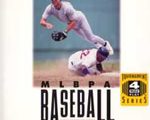
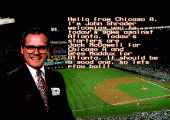
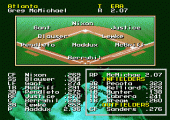
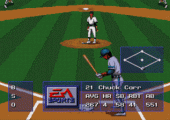
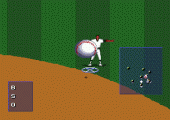
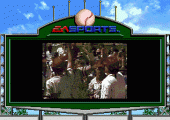
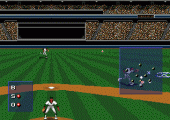
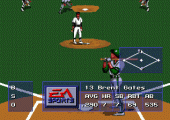
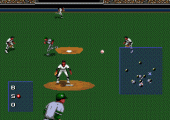
This is, in my opinion, the absolute best baseball game on the Genesis.